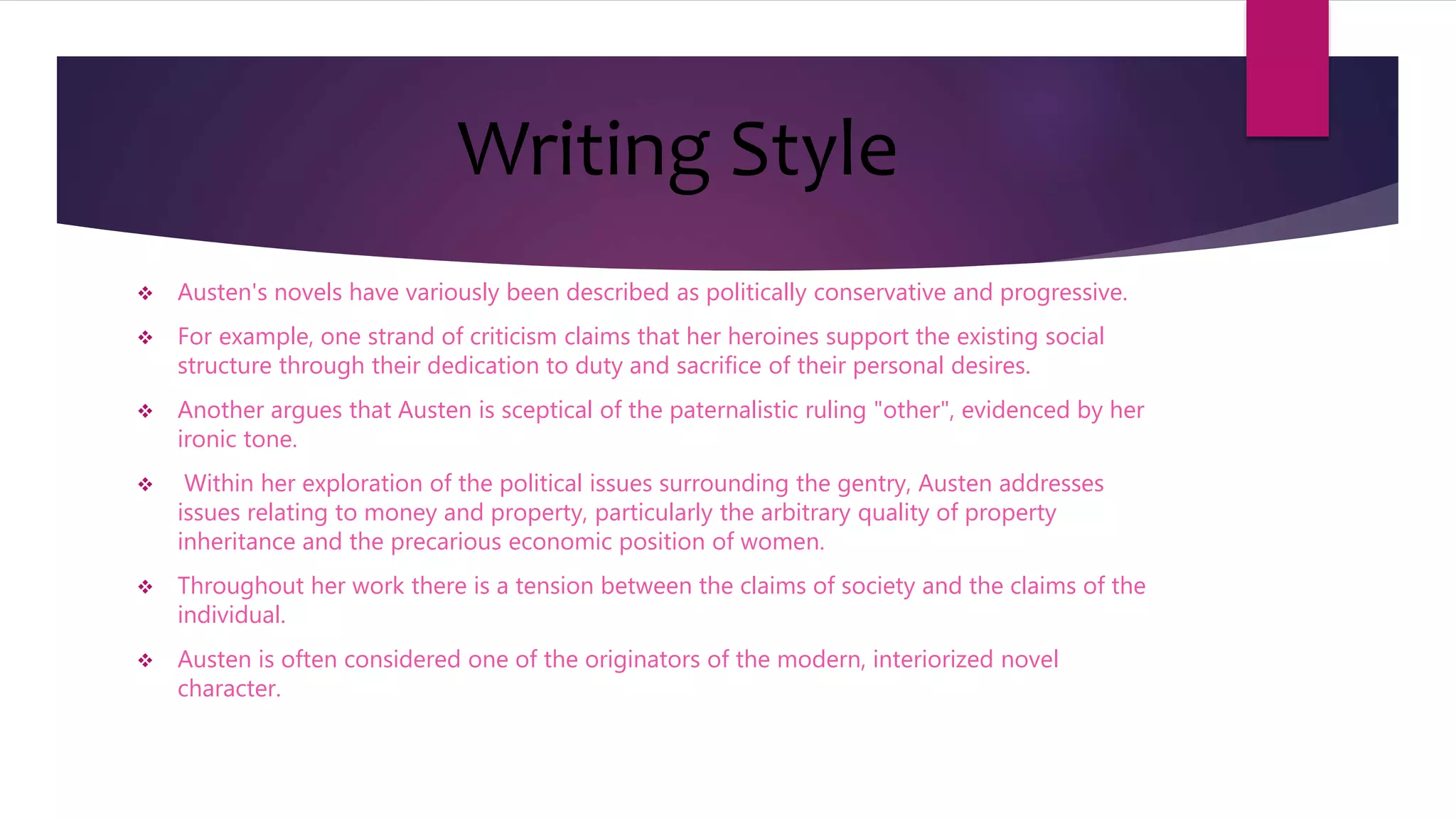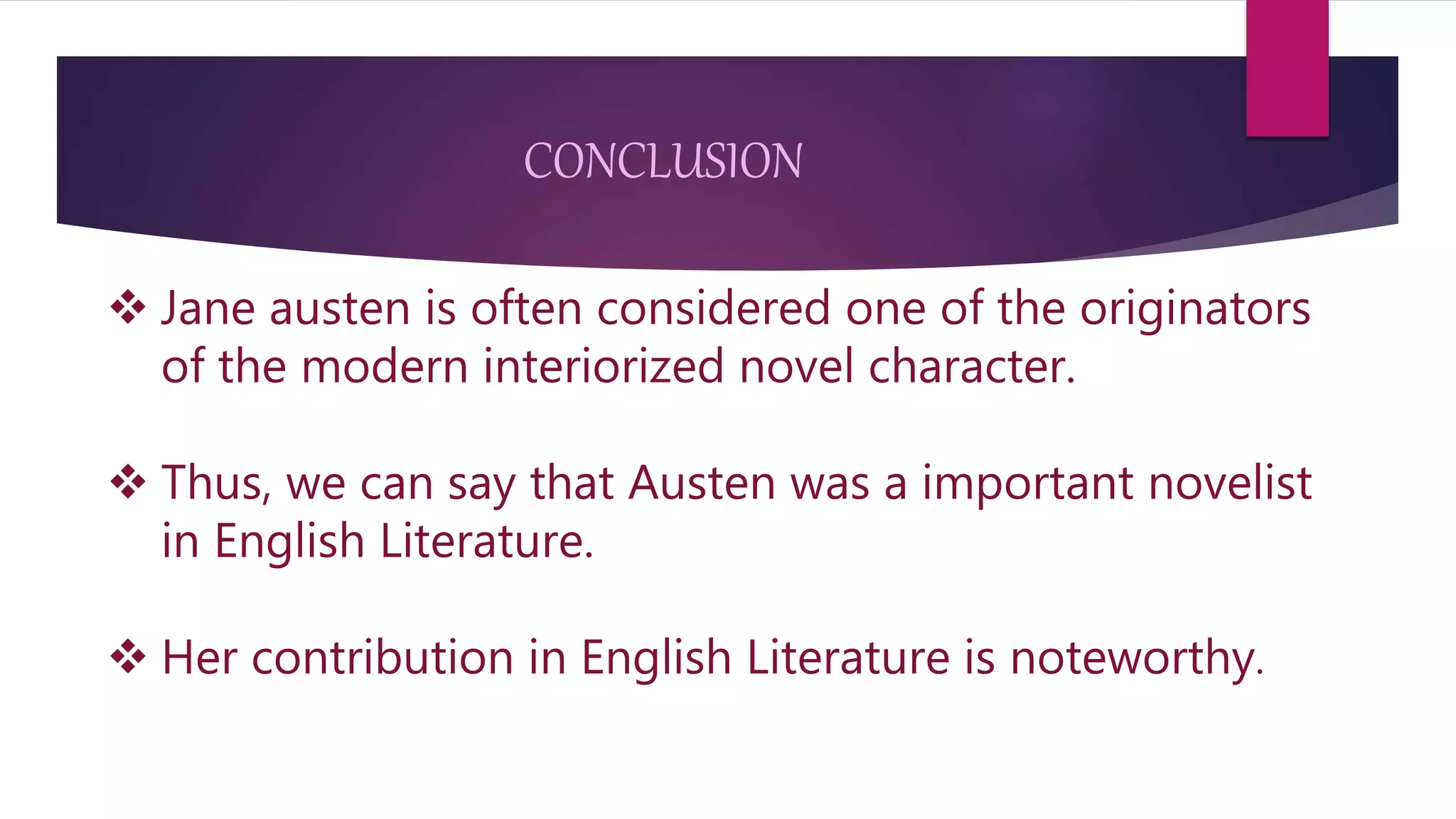Jane Austen: The Enduring Legacy Of A Georgian Novelist
Table of Contents
- The Life and Times of Jane Austen: A Brief Biography
- Early Life and Literary Beginnings
- The Major Works of an Austen Novelist
- Unpacking Austen's Enduring Themes
- The Unique Writing Process of an Austen Novelist
- The Lasting Legacy of Jane Austen
- Why Read an Austen Novelist Today?
The Life and Times of Jane Austen: A Brief Biography
Jane Austen was born on December 16, 1775, in Steventon, Hampshire, England. She was the seventh of eight children born to Reverend George Austen and Cassandra Leigh Austen. Her family environment was one that fostered intellectual curiosity and a love for literature, with access to a substantial library and a lively household that often engaged in theatrical performances and readings. This upbringing undoubtedly laid the groundwork for her future as an insightful Austen novelist. Despite the profound impact her works would later have, Jane Austen's life was relatively quiet and largely confined to the domestic sphere. She never married, although she had several suitors during her lifetime. This personal choice, or perhaps circumstance, offers a fascinating contrast to the central theme of marriage that permeates her novels. After her father's death, Austen and her mother and sister, Cassandra, moved to Southampton, and then in 1809, they settled in Chawton, where they had a cottage on one of her brother Edward’s Hampshire estates. It was in Chawton that she revised and published many of her most celebrated works. Here is a brief overview of key personal data for this celebrated Austen novelist:| Category | Detail |
|---|---|
| Full Name | Jane Austen |
| Born | December 16, 1775 |
| Birthplace | Steventon, Hampshire, England |
| Died | July 18, 1817 (aged 41) |
| Notable Occupation | Novelist |
| Era | Georgian Era / Romantic Period |
| Key Genres | Novel of manners, Satire, Romance |
| Spouse | Never married |
Early Life and Literary Beginnings
From a very young age, Jane Austen demonstrated a remarkable aptitude for storytelling. She began writing stories in her youth, showcasing a precocious talent for observation and narrative construction. These early writings, often referred to as her 'juvenilia,' include short stories and unfinished works, revealing her creative range even before her major novels took shape. These early experiments were crucial in honing the sharp wit and distinctive voice that would define her as an unparalleled Austen novelist. By her early twenties, Austen had already completed her first novel. For instance, she began a second novel, initially titled *First Impressions*, in 1796, completing its initial draft in August 1797, when she was just 21 years old. This work would later be published as *Pride and Prejudice*, arguably her most famous novel. It is a testament to her dedication and burgeoning skill that she was producing such sophisticated narratives at such a young age. As with all of her novels, it was an established practice for Austen to read her work aloud to her family as she was working on it, making them her first audience and critics. This intimate process underscores the collaborative and supportive environment in which her genius flourished.The Major Works of an Austen Novelist
Jane Austen is known primarily for her six completed novels, which implicitly interpret, critique, and comment upon the English landed gentry at the end of the 18th century. While two of these were published posthumously, their impact has been profound and lasting. These works are not merely love stories; they are intricate social commentaries that explore the dependence of women on marriage for the pursuit of favourable social standing and economic security. Her comprehensive overview of society, tailored for general readers and literary scholars alike, provides a chronological breakdown of her works, key characters, detailed plot summaries, and important quotes, highlighting aspects relevant to literary analysis and critical understanding. The listing below, ordered by publication date, covers Jane Austen's six completed novels:Sense and Sensibility (1811)
*Sense and Sensibility* tells the story of the impoverished Dashwood sisters, Elinor and Marianne, who represent the contrasting virtues of "sense" (prudence and reason) and "sensibility" (openness and enthusiasm). Marianne, the heroine of "sensibility," becomes infatuated with a dashing but unreliable suitor, leading to heartbreak. The novel explores themes Austen returned to over the years, including love, ethics, and gender roles. It was adapted into both a TV series and a movie within the past 25 years, proving its enduring appeal. Emma Tennant later published *Elinor and Marianne*, a sequel in the form of an epistolary novel, recounting the married lives of the Dashwood sisters, a nod to Austen's original format for *Sense and Sensibility*. There's even a mashup parody novel, *Sense and Sensibility and Sea Monsters* by Ben H., showcasing the novel's pervasive cultural presence.Pride and Prejudice (1813)
Perhaps the most beloved work by this Austen novelist, *Pride and Prejudice* is a novel of manners that follows the character development of Elizabeth Bennet, the protagonist of the book, who learns about the repercussions of hasty judgments and comes to understand the true nature of love and social standing. The witty banter, memorable characters like Mr. Darcy, and the exploration of societal expectations have made it a timeless classic. Its enduring popularity is a testament to Austen's ability to craft narratives that transcend their historical context.Emma (1815)
*Emma* focuses on a well-intentioned but often misguided young woman who delights in matchmaking, often with disastrous results. Through Emma Woodhouse's journey of self-discovery, Austen critiques the dangers of meddling and the importance of self-awareness. It's a brilliant character study, showcasing Austen's mastery of irony and psychological depth.Other Notable Novels
Beyond these three, the Austen novelist also penned: * ***Mansfield Park*** **(1814):** A more serious and moralistic novel, exploring themes of duty, integrity, and the corrupting influence of wealth. * ***Persuasion*** **(1817, published posthumously):** A poignant story of second chances and enduring love, often considered one of Austen's most mature works. * ***Northanger Abbey*** **(1817, published posthumously):** A delightful satire of Gothic novels and a charming coming-of-age story. These six novels, along with her juvenilia and unfinished works, solidify Jane Austen's position as a literary giant.Unpacking Austen's Enduring Themes
The works of an Austen novelist are rich tapestries woven with recurring themes that remain profoundly relevant even today. At their core, Austen's plots often explore the dependence of women on marriage for the pursuit of favourable social standing and economic security. In a society where women had limited legal and financial rights, marriage was not merely a romantic endeavor but a critical economic necessity. Her novels illuminate this reality with unflinching honesty, showcasing the pressures, calculations, and occasional triumphs associated with finding a suitable match. Beyond the institution of marriage, Austen's writings often focused on themes of: * **Love and Courtship:** While often intertwined with practicality, genuine affection and romantic love are central to her narratives. She masterfully depicts the nuances of attraction, misunderstanding, and eventual understanding between her characters. * **Social Commentary and Class:** Jane Austen was a Georgian era author, best known for her social commentary in novels. She meticulously portrays the rigid class structures of her time, satirizing the follies and pretensions of the landed gentry while also highlighting their virtues. Her observations implicitly interpret, critique, and comment upon this segment of English society. * **Gender Roles:** Austen's novels consistently explore the prescribed roles for women in society, the limitations they faced, and the subtle ways in which intelligent women navigated these constraints. Her heroines, while bound by societal norms, often display remarkable resilience, wit, and independent thought. * **Ethics and Morality:** Characters in Austen's novels are constantly faced with moral dilemmas, forcing them to confront their own prejudices, pride, and ethical responsibilities. The development of character, particularly in protagonists like Elizabeth Bennet, often revolves around learning to make sound moral judgments. * **The Importance of Family:** Family dynamics, sibling relationships, and parental influences play a significant role in shaping her characters and driving the plots forward. These interwoven themes make an Austen novel a timeless exploration of human nature, societal expectations, and the eternal quest for happiness and belonging.The Unique Writing Process of an Austen Novelist
Jane Austen's approach to writing was distinct and, by modern standards, remarkably private. All of her work was published anonymously during her lifetime, and few outside of her family were aware of her authorship. This anonymity allowed her to comment freely on society without the direct scrutiny that a named female author might have faced. The phrase "By a Lady" often appeared on the title pages of her published works. Her creative process involved meticulous crafting and revision. We know she began writing stories at a very young age and completed her first novel in her early twenties. The transition of *First Impressions* to *Pride and Prejudice* over several years, including significant revisions, illustrates her dedication to perfecting her craft. The practice of reading her work aloud to her family was a crucial part of her editing process, allowing her to gauge the flow, dialogue, and comedic timing of her narratives. This intimate feedback loop contributed to the polished and engaging prose that defines her style. Today, thanks to digital initiatives, her works can also be found online. Facsimiles of all her surviving manuscripts are collected online in *Jane Austen’s Fiction Manuscripts Digital Edition*, offering invaluable insight into her revisions and the evolution of her stories. This resource allows scholars and enthusiasts to delve deeper into the mind of this remarkable Austen novelist.The Lasting Legacy of Jane Austen
While not widely known in her own time, the reputation of Jane Austen skyrocketed in the 20th century, particularly after 1869, when her comic novels of love among the landed gentry gained significant popularity. Today, she is considered one of the most important and influential figures in English literature. Her impact is evident in numerous ways: * **Literary Influence:** Countless authors have drawn inspiration from her narrative techniques, character development, and social commentary. She pioneered the "novel of manners," a genre that continues to be explored. * **Academic Study:** Her works are a staple in literary curricula worldwide. This comprehensive overview of Jane Austen's major novels is tailored for students preparing for examinations, providing detailed plot summaries, key characters, and important quotes for literary analysis. * **Cultural Adaptations:** Austen's novels have been adapted into countless films, television series, stage plays, and even modern retellings. From faithful period dramas to contemporary romantic comedies, her stories continue to captivate new audiences. * **Global Recognition:** Her characters and plots are universally recognized, transcending cultural barriers. The struggles for love, status, and self-understanding are themes that resonate with people across the globe. * **Fandom:** A passionate global community of "Janeites" celebrates her work, attending conferences, visiting historical sites, and engaging in lively discussions about her characters and themes. Her ability to implicitly interpret, critique, and comment upon the English landed gentry at the end of the 18th century, while simultaneously crafting engaging human stories, is a testament to her enduring genius.Why Read an Austen Novelist Today?
In an age of rapid change and digital distraction, why should one turn to an Austen novelist? The answer lies in the timelessness of her observations and the enduring appeal of her characters. Her novels offer more than just historical escapism; they provide profound insights into human psychology, societal pressures, and the universal search for happiness and belonging. Reading Jane Austen allows us to: * **Understand Historical Context:** Gain a deeper appreciation for the social structures, economic realities, and gender roles of the Georgian era. * **Develop Critical Thinking:** Analyze the subtle ironies, moral dilemmas, and complex character motivations that permeate her narratives. * **Enjoy Masterful Prose:** Delight in her elegant language, sharp wit, and perfectly crafted dialogue. * **Relate to Universal Themes:** Recognize the echoes of pride, prejudice, love, and family dynamics in our own lives, despite the passage of centuries. Whether you are a student preparing for an examination, a casual reader seeking a compelling story, or someone interested in the foundations of the modern novel, an Austen novel offers a rich and rewarding experience. Her keen eye for human folly and virtue, combined with her unparalleled ability to craft engaging narratives, ensures that Jane Austen will remain a beloved and relevant voice for generations to come. We hope this exploration of Jane Austen, the celebrated Austen novelist, has deepened your appreciation for her extraordinary contributions to literature. What is your favorite Jane Austen novel, and why? Share your thoughts in the comments below, and don't forget to explore our other articles on classic English literature!
Jane Austen: Great Britain's Greatest Novelist | Books on the Wall

Jane austen (novelist) | PPT

Jane austen (novelist) | PPT